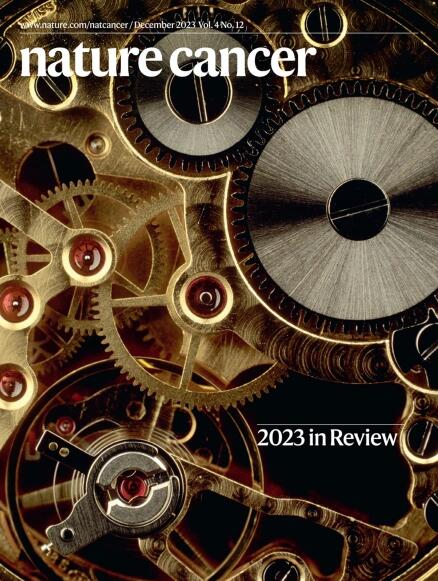Oncostreams organize peritumoral glioma infiltration
IF 28.5
1区 医学
Q1 ONCOLOGY
引用次数: 0
Abstract
Glioblastoma (GBM) is highly invasive, but the crosstalk between GBM cells and glia at the invasion front is unclear. A study now analyzes the invasive region and shows that GBM cells induce plexin-B2 expression in macrophages and microglia to guide extracellular matrix remodeling and facilitate a shift from bulk to infiltrative GBM growth.

肿瘤流组织肿瘤周围胶质瘤浸润。
胶质母细胞瘤(GBM)具有高度侵袭性,但在侵袭前沿,GBM细胞与胶质细胞之间的串扰尚不清楚。现在一项研究分析了侵袭区,表明GBM细胞在巨噬细胞和小胶质细胞中诱导丛状蛋白b2表达,引导细胞外基质重塑,促进GBM从块状向浸润性生长转变。
本文章由计算机程序翻译,如有差异,请以英文原文为准。
求助全文
约1分钟内获得全文
求助全文
来源期刊

Nature cancer
Medicine-Oncology
CiteScore
31.10
自引率
1.80%
发文量
129
期刊介绍:
Cancer is a devastating disease responsible for millions of deaths worldwide. However, many of these deaths could be prevented with improved prevention and treatment strategies. To achieve this, it is crucial to focus on accurate diagnosis, effective treatment methods, and understanding the socioeconomic factors that influence cancer rates.
Nature Cancer aims to serve as a unique platform for sharing the latest advancements in cancer research across various scientific fields, encompassing life sciences, physical sciences, applied sciences, and social sciences. The journal is particularly interested in fundamental research that enhances our understanding of tumor development and progression, as well as research that translates this knowledge into clinical applications through innovative diagnostic and therapeutic approaches. Additionally, Nature Cancer welcomes clinical studies that inform cancer diagnosis, treatment, and prevention, along with contributions exploring the societal impact of cancer on a global scale.
In addition to publishing original research, Nature Cancer will feature Comments, Reviews, News & Views, Features, and Correspondence that hold significant value for the diverse field of cancer research.
 求助内容:
求助内容: 应助结果提醒方式:
应助结果提醒方式:


